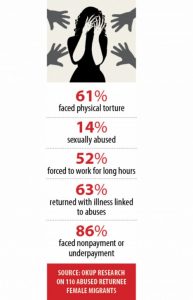Abused abroad, humiliated at home
Tortured female migrants again face intimidation during arbitration on return; remain silent due to social stigma
On their return from the Middle East, including Saudi Arabia and Lebanon, abused female migrant workers often face intimidation and injustice during government arbitration at home.
Many don’t even dare to file complaints fearing social stigma, while others face threats from the manpower brokers.
These were the findings of a research conducted by migrant rights body Ovibashi Karmi Unnayan Program (OKUP) on 110 female domestic workers who returned from the Middle Eastern countries between January and December last year.
OKUP Executive Director Shakirul Islam, who led the research, titled “Access to justice for Bangladeshi migrant workers: improving the arbitrary system”, said it is not a national representative research, but brings out the realities of how the arbitration takes place.
The experience of Shafia Begum (not her real name), a returnee from Lebanon, could be a case in point. She had gone to the Middle Eastern country as a domestic worker in January 2015, spending Tk 30,000 though it was supposed to be free. She was promised a monthly salary of Tk 12,000.
Shafia could work only for a month.
The 30-year-old was not given enough food and whenever she asked for more, she was mercilessly beaten by her employer.
She eventually fell sick and the employer sent her to the Lebanese recruiting office, which then placed her under another employer.

“I was forced to work in three houses. I hardly had any time to sleep. I became so weak that I had to see a doctor, who advised me to go back home,” Shafia, who now lives in the capital’s Demra, told The Daily Star over phone.
The employer paid her only six months’ salaries — Tk 60,000 — though she worked for him over a year. He then left Shafia at the Bangladesh Embassy in Lebanon. She was kept in a safe house for a year before the embassy arranged her return.
After her return in 2017, OKUP helped her lodge a complaint with the Bureau of Manpower Employment and Training (BMET) early last year. After three hearings, a BMET officer settled the complaint by fining the manpower broker, who had sent her to Lebanon, only Tk 20,000.
She said she had demanded compensation worth at least one year’s salaries and treatment costs and that the amount offered to her was nothing but a joke.
“My [manpower] broker also shouted at me for making the complaint,” she said.
According to the research, only 48 of the 110 returnee female domestic workers surveyed had filed complaints with the BMET. Others did not want to do it fearing either social stigma or threats from the manpower brokers.
The research further said Bangladesh has the Overseas Employment and Migrant Act 2013 for the management of recruitment, and any migrant can file a police case if the person faces fraudulence or abuse. They can also complain to the BMET for arbitration.
As lodging a police report involves lengthy procedures and financial expenditure, arbitration at the BMET is a better option, said Shakirul Islam.
He, however, said the study revealed gross loopholes in this process that fails to protect the abused migrants’ rights.
The BMET doesn’t have a dedicated office or a code of conduct on how to conduct the arbitration.
“This creates imbalance of power between the officials, staffers [of recruiting agencies] or brokers involved, and the migrant workers. This leaves the migrants vulnerable to further manipulation and exploitation,” said Shakirul.
The Overseas Employment and Migration Management Rules 2017 allows legal representation of the migrants, but they can’t arrange it due to financial reasons.
“They [complainants] often face disrespect, misconduct and/or unequal treatment. Some NGOs assist migrants in the arbitration process, but face challenges from groups with vested interests,” the study observed.
Shakirul also said the 48 complainants whose cases were settled last year and this year got on average around Tk 10,000 in compensation. Last year, a total of 315 complaints were settled by the BMET after which the victims, on an average, received Tk 9,200.
The importance of the issue is paramount, as thousands of abused female migrants have been returning from the Middle East in recent years.
The complaints included physical, sexual and mental torture. Many were unpaid for months. Some also returned pregnant and faced social stigma.
There are also cases of suicides by female migrants, especially in Saudi Arabia and Lebanon.
“We need to review the act and make it migrant-friendly. Otherwise, the women, abused abroad, face injustice at home again. It’s not acceptable,” said Shakirul Islam.
He also suggested that the state provides legal assistance to the abused migrants.
Since 1991, a total of 8.75 lakh Bangladeshi women migrated abroad, mostly to the Middle East, for domestic work. There is no data on how many of them returned or who returned after facing abuses.
The Brac Migration Programme says it has recorded the return of at least 1,365 abused female workers in 2018 and some 900 until yesterday this year.
Officials said filing cases against the employers in the destination countries is difficult as the survivors of exploitation need to stay to pursue any case, but they cannot do it.
Source: The Daily Star


